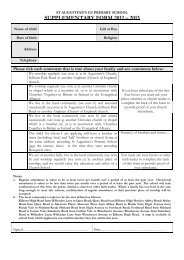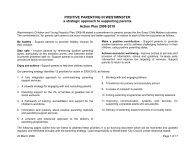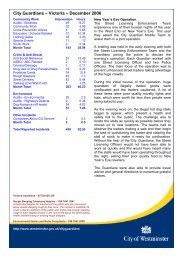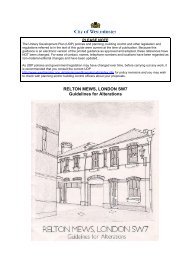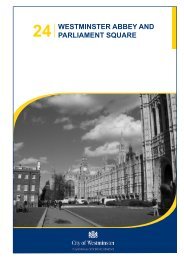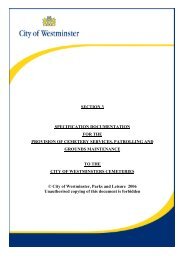Statement of Licensing Policy (2008) WCC - Westminster City Council
Statement of Licensing Policy (2008) WCC - Westminster City Council
Statement of Licensing Policy (2008) WCC - Westminster City Council
You also want an ePaper? Increase the reach of your titles
YUMPU automatically turns print PDFs into web optimized ePapers that Google loves.
Flyposting is a public nuisance. Entertainment venues are one <strong>of</strong> the main types <strong>of</strong>business that resort to this type <strong>of</strong> advertising. Touting for business on the street isgenerally a nuisance and has been prevented by conditions on premises licencesthat have caused problems. The deployment <strong>of</strong> placard holders can similarly create anuisance but not particularly associated with licensed premises. It can be controlledin designated areas under the London Local Authorities Act 2007 if its provisions areadopted.2.2.15 In those parts <strong>of</strong> the city characterised by round-the-clock activity, the council operatesa 24-hour cleansing service. However, at the busiest times and in the busiest places itis sometimes impossible to maintain streets to a high standard <strong>of</strong> cleanliness. In suchlocations, a “window <strong>of</strong> opportunity” is needed between about 02:30 and 05:00 whenthe streets are suffi ciently empty to sweep them effectively and to use mechanicalequipment, in order to restore a high standard <strong>of</strong> cleanliness before the start <strong>of</strong> thenext working day.Conditions2.2.16 Annex D part 4 <strong>of</strong> the revised Guidance sets out a pool <strong>of</strong> conditions that relate to theprevention <strong>of</strong> public nuisance. Hours <strong>of</strong> opening and hours for each licensable activitymust be included in Operating Schedules. Conditions will be attached on the hourswhen premises are permitted to be open to the public or to members and their guestsfor the prevention <strong>of</strong> public nuisance. Conditions could be necessary to limit the timeswhen certain licensable activities take place, although the premises may be open tothe public at such times. For example, there may be reason to have a condition on thehour that music ceases to be played in a bar or restaurant, or when alcohol is servedat a music venue, which is prior to the end <strong>of</strong> other licensable activities. Conditionsmay also be attached referring to the parts <strong>of</strong> premises that might be used for certainlicensable activities at certain times. Stricter conditions will be expected in areas <strong>of</strong>denser residential accommodation2.2.17 Conditions will be attached to premises licences where appropriate. These mayinclude conditions on: maximum noise levels over particular time periods, theinstallation <strong>of</strong> acoustic lobbies; provision <strong>of</strong> signs, publicity and verbal advice topatrons to leave quietly and by certain routes; controlling nuisance from light pollution;taking food or drink outside the premises; fl yposting; distribution <strong>of</strong> leafl ets; litter andcleaning outside <strong>of</strong> the frontage and in the vicinity <strong>of</strong> the premises. (See paragraph3.1.7 <strong>of</strong> this document on the council’s pool <strong>of</strong> model conditions).31




